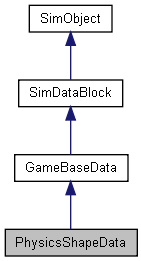
|
|
|
PhysicsShapeData Class Reference
[Physics]
Defines the properties of a PhysicsShape. More...

Public Attributes | |
Physics | |
| float | angularDamping |
| Value that reduces an object's rotational velocity over time. | |
| float | angularSleepThreshold |
| Minimum rotational velocity before the shape can be put to sleep. | |
| float | buoyancyDensity |
| The density of the shape for calculating buoyant forces. | |
| float | friction |
| Coefficient of kinetic friction to be applied to the shape. | |
| float | linearDamping |
| Value that reduces an object's linear velocity over time. | |
| float | linearSleepThreshold |
| Minimum linear velocity before the shape can be put to sleep. | |
| float | mass |
| Value representing the mass of the shape. | |
| float | restitution |
| Coeffecient of a bounce applied to the shape in response to a collision. | |
| float | staticFriction |
| Coefficient of static friction to be applied to the shape. | |
| float | waterDampingScale |
| Scale to apply to linear and angular dampening while underwater. | |
Media | |
| PhysicsDebrisData | Debris |
| Name of a PhysicsDebrisData to spawn when this shape is destroyed (optional). | |
| PhysicsShapeData | destroyedShape |
| Name of a PhysicsShapeData to spawn when this shape is destroyed (optional). | |
| ExplosionData | Explosion |
| Name of an ExplosionData to spawn when this shape is destroyed (optional). | |
| filename | shapeName |
| Path to the .DAE or .DTS file to use for this shape. | |
Networking | |
| PhysicsSimType | simType |
| Controls whether this shape is simulated on the server, client, or both physics simulations. | |
Detailed Description
Defines the properties of a PhysicsShape.
- See also:
- PhysicsShape.
Member Data Documentation
Value that reduces an object's rotational velocity over time.
Larger values will cause velocity to decay quicker.
Minimum rotational velocity before the shape can be put to sleep.
This should be a positive value. Shapes put to sleep will not be simulated in order to save system resources.
- Note:
- The shape must be dynamic.
The density of the shape for calculating buoyant forces.
The result of the calculated buoyancy is relative to the density of the WaterObject the PhysicsShape is within.
- See also:
- WaterObject::density
Name of a PhysicsDebrisData to spawn when this shape is destroyed (optional).
Name of a PhysicsShapeData to spawn when this shape is destroyed (optional).
Name of an ExplosionData to spawn when this shape is destroyed (optional).
Coefficient of kinetic friction to be applied to the shape.
Kinetic friction reduces the velocity of a moving object while it is in contact with a surface. A higher coefficient will result in a larger velocity reduction. A shape's friction should be lower than it's staticFriction, but larger than 0.
- Note:
- This value is only applied while an object is in motion. For an object starting at rest, see PhysicsShape::staticFriction
Value that reduces an object's linear velocity over time.
Larger values will cause velocity to decay quicker.
Minimum linear velocity before the shape can be put to sleep.
This should be a positive value. Shapes put to sleep will not be simulated in order to save system resources.
- Note:
- The shape must be dynamic.
| float PhysicsShapeData::mass |
Value representing the mass of the shape.
A shape's mass influences the magnitude of any force exerted on it. For example, a PhysicsShape with a large mass requires a much larger force to move than the same shape with a smaller mass.
- Note:
- A mass of zero will create a kinematic shape while anything greater will create a dynamic shape.
Coeffecient of a bounce applied to the shape in response to a collision.
Restitution is a ratio of a shape's velocity before and after a collision. A value of 0 will zero out a shape's post-collision velocity, making it stop on contact. Larger values will remove less velocity after a collision, making it 'bounce' with a greater force. Normal restitution values range between 0 and 1.0.
- Note:
- Values near or equaling 1.0 are likely to cause undesirable results in the physics simulation. Because of this it is reccomended to avoid values close to 1.0
| filename PhysicsShapeData::shapeName |
Path to the .DAE or .DTS file to use for this shape.
Compatable with Live-Asset Reloading.
Controls whether this shape is simulated on the server, client, or both physics simulations.
Coefficient of static friction to be applied to the shape.
Static friction determines the force needed to start moving an at-rest object in contact with a surface. If the force applied onto shape cannot overcome the force of static friction, the shape will remain at rest. A larger coefficient will require a larger force to start motion. This value should be larger than zero and the physicsShape's friction.
- Note:
- This value is only applied while an object is at rest. For an object in motion, see PhysicsShape::friction
Scale to apply to linear and angular dampening while underwater.
Used with the waterViscosity of the
- See also:
- angularDamping linearDamping